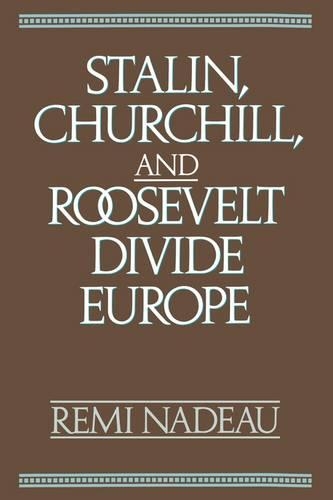
Stalin, Churchill, and Roosevelt Divide Europe
(Hardback)
Publishing Details
Stalin, Churchill, and Roosevelt Divide Europe
By (Author) Remi Nadeau
Bloomsbury Publishing PLC
Praeger Publishers Inc
30th December 1990
United States
Classifications
Tertiary Education
Non Fiction
European history
Second World War
Modern warfare
940.5322
Physical Properties
Hardback
272
Description
The division of Europe between East and West, born during World War II, not only denied independence to more than 100 million East Europeans, but upset the balance of global power, putting Stalin in a position to threaten Western Europe and planting the seeds of the Cold War and the arms race. This book probes the questions and facts surrounding the division of Europe and offers new insight into how it might have been prevented. Looking beyond the conventional assumption that Stalin simply took over Eastern Europe in the postwar years, Remi Nadeau demonstrates how the Soviet leader, having gained power in Eastern Europe through Red Army occupation, was unrestrained by any prior Allied agreements. The Sovietization of Eastern Europe, which is believed to have occurred in the immediate postwar years, actually came about, the author argues, during the war as the Allies failed to limit Stalin. Nadeau shows how the British, who recognized the Soviet threat, repeatedly tried to block it and how Roosevelt, with a different foreign policy approach, did not support them. He demonstrates how Roosevelt's failure to throw US strength into the political balance was not confined to the Valta Conference in 1945, but was a consistent US policy in East-West encounters throughout the war. Nadeau shows that Roosevelt did not understand Stalin's intentions and repeatedly failed to support Churchill's attempts to block Stalin with diplomatic bargaining and military pre-emption.
Reviews
"Remi Nadeau's assessment of the role played by American innocence and idealism in determining the course of the history of Eastern Europe between 1939 and 1989 is, in my view, the outstanding feature of this thorough study. Let us hope that American innocence and idealism will not play a similar role in determining the course of the history of Eastern Europe in the 1990s."- Stephen Fischer-Galati Distinguished Professor Department of History University of Colorado at Boulder
"The book is written for both experts and a large audience interested in the rise and fall of the Soviet empire in Eastern Europe. The conferences at Teheran and Yalta are revisited as well as the crucial years when the fate of Eastern Europe was decided. The style is lively, the topic exciting. The book is relevant to recent dramatic changes in Europe."-Dimitrije Djordjevic Professor of History University of California, Santa Barbara
Particularly welcome at a time when the iron curtain is becoming a memory and we are all looking for lessons and maxims from the past to guide us in dealing with an increasingly unpredictable future.-Perspectives on Political Science
"Particularly welcome at a time when the iron curtain is becoming a memory and we are all looking for lessons and maxims from the past to guide us in dealing with an increasingly unpredictable future."-Perspectives on Political Science
Author Bio
REMI NADEAU, who received a B.A. degree from Stanford University and a Ph.D. from the University of California, Santa Barbara, is a professional historian who has written seven previous books on American history. Serving as an intelligence officer with the U.S. Air Force in the European theater during World War II, he has travelled extensively in Europe, including trips in Eastern Europe and the Soviet Union.
